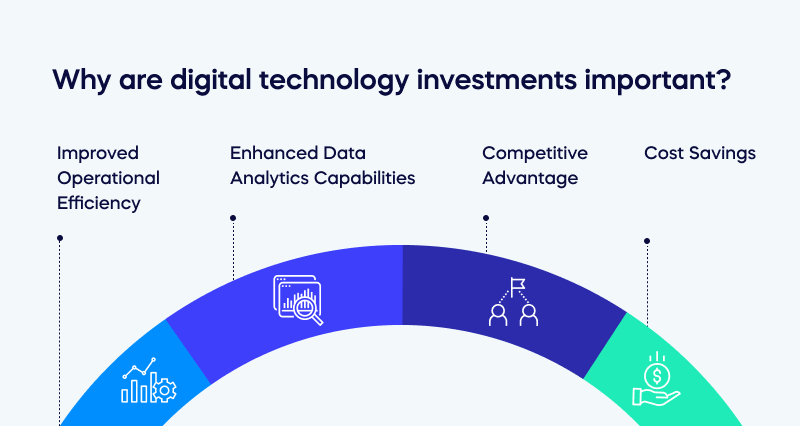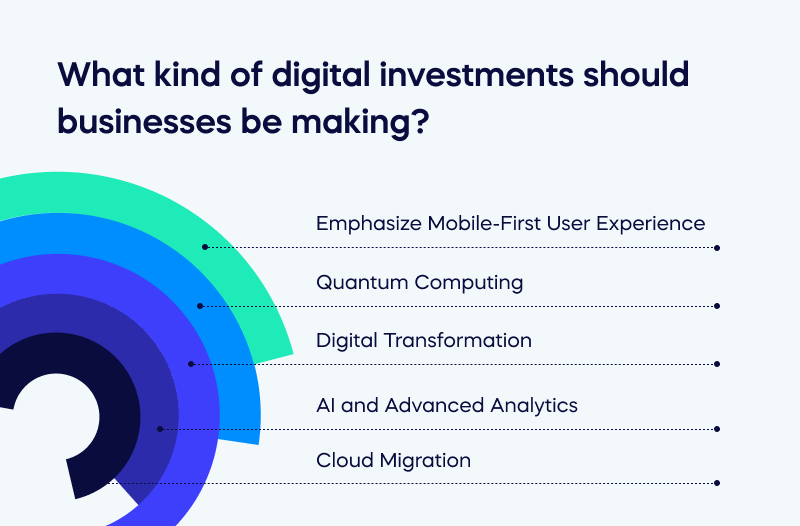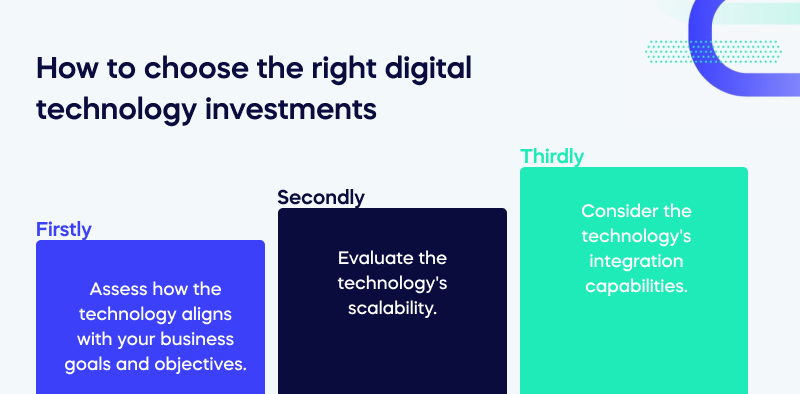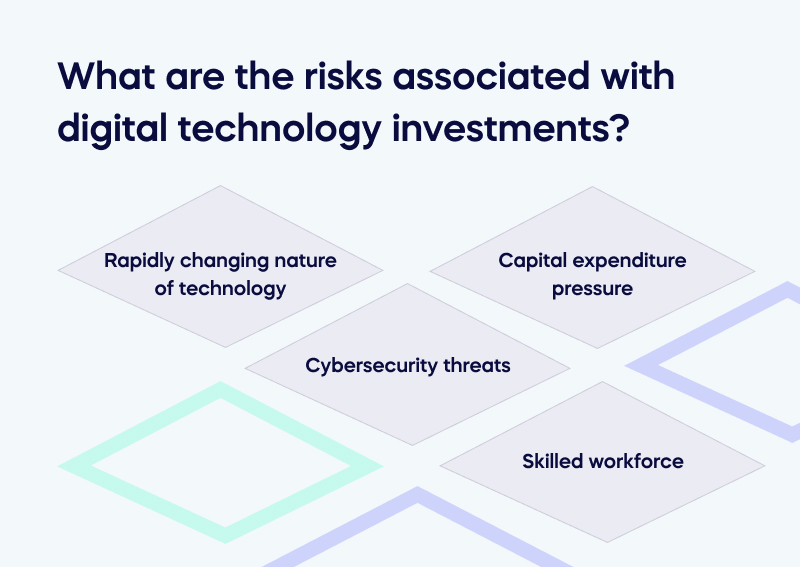With the increasing shift towards a digital-first economy, investing in digital technologies has become increasingly important for businesses of all sizes and industries.
According to Statista’s projection, the digital technology investment market’s total transaction value is expected to hit US$3.22tn by 2023. This will significantly impact how companies do business and approach investments in future digital technologies.
Let’s first define what digital technology investments are.
Digital technology investments refer to the allocation of resources towards digital tools and platforms such as software, hardware, applications, and cloud-based solutions that enable businesses to operate more efficiently, effectively, and competitively.
Digital technology investments can enhance data security, facilitate remote work, and provide valuable insights into business processes. These factors can contribute to increased profitability and competitiveness in the long run.
You’ll be shocked to discover that most businesses aren’t investing enough in digital technology. According to a survey conducted by Deloitte, only 21% of companies are making significant investments in digital technologies.
This article will help you understand why making digital technology investments are important for businesses of all sizes and industries.
We will focus on:
1. What are the benefits of investing in digital technologies?
2. What kind of digital investments should businesses be making?
3. How to choose the right digital technology investments
4. What are the risks associated with digital technology investments?
By understanding the benefits, types of investments, how to choose the right investments, and associated risks of digital technology investments, businesses can make well-informed decisions on their investments in 2023 and beyond.
What are digital technology investments?
Digital technology investments refer to allocating financial resources toward acquiring and implementing new technological tools and systems that enhance business operations.
These investments aim to increase efficiency, productivity, and competitiveness in an ever-evolving technological landscape. IT departments play a critical role in implementing these investments as they require technical expertise in integrating new tools into existing infrastructure.
Digital technology investments can include hardware, software, and cloud-based solutions that improve business processes such as communication, data management, and customer experience. The success of these investments is measured by their ability to generate measurable returns on investment.
Why are digital technology investments important?

Digital technology investments play a critical role in promoting the growth and success of businesses in today’s digital economy.
Here is why such investments are beneficial:
- Improved Operational Efficiency: Digital technologies, such as automation, Artificial Intelligence (AI), and Machine Learning (ML), can streamline business operations and improve operational efficiency. Businesses can achieve faster turnaround times with fewer errors by automating repetitive tasks. AI and ML algorithms provide valuable process optimization and error reduction insights, resulting in more efficient and effective operations.
- Enhanced Data Analytics Capabilities: Digital technology investments enable businesses to collect and analyze large amounts of data and make data-driven decisions using advanced analytics tools. Artificial intelligence and machine learning algorithms help identify patterns in the data that would be otherwise impossible to detect manually. Advanced analytics tools also facilitate accurate forecasting and predictive analysis, enabling businesses to respond proactively to market changes and opportunities.
- Competitive Advantage: Companies that invest in digital technology gain a competitive advantage over their peers. By leveraging digital technologies, businesses deliver products and services that meet customers’ needs better, faster, and cost-effectively. They can also offer customers personalized experiences, creating loyalty and driving growth.
- Cost Savings: Digital technology investments can save significant costs by reducing manual labor, streamlining process improvement, and improving productivity. For example, cloud computing allows businesses to access scalable computing resources as needed, eliminating costly infrastructure investments.
What kind of digital investments should businesses be making?

Businesses should invest in various digital technologies to ensure their operations remain competitive and efficient.
These investments should include the latest hardware, software, cloud-based solutions, and applications that can help accelerate business operations. Businesses should also consider investing in AI and ML algorithms and data analytics tools to gain insights into customer behavior and market trends.
We’ve outlined five trending investment opportunities for businesses hoping to stay ahead of the competition:
1. Emphasize Mobile-First User Experience
Mobile-first user experience is critical for businesses since more than half of website traffic comes from mobile devices. Google’s search algorithm prioritizes mobile-optimized websites, meaning companies must ensure they are mobile-friendly to rank high on search engines.
This involves designing easy-to-use and visually appealing mobile interfaces, optimizing load times, and providing an excellent mobile experience for visitors.
Businesses should also consider developing mobile applications to enhance the customer experience, increase loyalty and engagement, and provide a unique value proposition.
2. Quantum Computing
Quantum computing is an emerging technology that has the potential to revolutionize computing by performing complex calculations exponentially faster than classical computers.
This technology can be a game-changer for businesses that require massive computational power and significantly raise adoption for those in finance, healthcare, logistics, and more.
Quantum computing operates on the principles of quantum mechanics, which allows for creating qubits (quantum bits) that can exist in multiple states simultaneously. Investing in quantum computing can give businesses a competitive edge by accelerating their research and development capabilities, improving decision-making processes, and enhancing operational efficiencies.
With quantum computing, businesses can develop novel applications and solve complex problems that were previously impossible or impractical.
3. Digital Transformation
Digital transformation is a complex and multifaceted process that involves the integration of modern digital technologies into all areas of a business.
Adopting these advanced tools and platforms can enable companies to achieve significant operational efficiencies, streamline their processes, reduce costs, and enhance their offerings to meet the ever-evolving needs of their customers.
Investment in digital transformation can take many forms, including implementing cloud-based solutions, upgrading legacy IT systems, automating manual processes, and leveraging data analytics to gain insights into customer behaviors and preferences. By adopting these cutting-edge technologies, businesses can drive innovation and gain a competitive edge in their respective markets.
Digital transformation is not just about implementing new technologies but rather a strategic effort to fundamentally change how a business operates and delivers value to its customers. This involves a cultural shift within the organization and a concerted effort to upskill and reskill the workforce to stay ahead of the curve.
Continually investing in digital transformation enables businesses to stay agile and flexible in the face of rapidly changing market conditions. They can better anticipate and respond to the evolving needs of their customers, thereby enhancing their overall customer experience and driving growth and profitability.
4. AI and Advanced Analytics
Managing and analyzing data from multiple sources can be overwhelming and time-consuming, resulting in missed business opportunities. However, with AI and advanced analytics integration, businesses can now access valuable insights, automate monotonous tasks, and enhance customer satisfaction.
AI and advanced analytics technologies like big data, machine learning, and natural language processing can help organizations uncover hidden patterns and trends and predict future outcomes. By processing large amounts of data at high speed, businesses can make informed decisions that lead to better business outcomes.
One of the main benefits of investing in AI and advanced analytics is the ability to personalize the customer experience. By analyzing customer data, businesses can tailor their offerings to individual preferences, behaviors, and needs, resulting in stronger customer relationships and increased loyalty. Additionally, these technologies can optimize operations by automating previously manual tasks, freeing up employee time.
Another advantage is that advanced analytics can provide real-time data insights, enabling businesses to make informed decisions that lead to better outcomes. For instance, analyzing sales data can help companies to predict future demand, optimize pricing and inventory, and avoid stockouts.
5. Cloud Migration
As businesses continue to grow, the need for a reliable, flexible, and secure IT infrastructure becomes more important than ever. Cloud migration involves moving business applications and data to cloud-based infrastructure, which can help organizations reduce maintenance costs, improve scalability, enhance security, and increase flexibility.
To migrate to the cloud, businesses must choose the right cloud provider, assess their existing IT infrastructure, design a migration plan, and execute the migration. By investing in cloud migration, businesses can take advantage of the latest technology and gain a competitive edge.
Cloud infrastructure offers businesses several benefits, including reduced maintenance costs, enhanced security, and improved scalability.
Furthermore, cloud migration allows businesses to quickly adapt to changing market conditions. With improved scalability, companies can easily scale up or down as needed without worrying about investing in new hardware or software. This gives businesses the flexibility they need to respond quickly to market demands.
How to choose the right digital technology investments

Investing in digital technology is a critical aspect of any modern business strategy. However, choosing the right technology investments that offer the most value for your business can be challenging with so many options available.
That’s why it’s crucial to evaluate potential investments using both technical and business-savvy criteria.
- Firstly, assess how the technology aligns with your business goals and objectives. Will it enhance productivity and profitability or improve customer experience?
- Secondly, evaluate the technology’s scalability. Can the technology grow alongside your business, or will you outgrow it too soon?
- Thirdly, consider the technology’s integration capabilities. Will it integrate with your existing tech stack or require extensive customization?
From a technical perspective, evaluate the technology’s functionality, performance, and security. Does it meet your technical requirements, or will it create technical debt? What level of support is offered by the vendor, and how quickly can they respond to issues? Is the technology secure, and what measures are in place to safeguard your data?
Considering the technology’s total cost of ownership (TCO) is vital. This includes the upfront cost and ongoing maintenance and support, training, and upgrades. Determine the estimated ROI of the investment and evaluate its impact on your bottom line.
Remember, the right technology investments can help your business thrive and stay ahead of the competition, while the wrong ones can hinder growth and productivity.
What are the risks associated with digital technology investments?

Investing in digital technology comes with a plethora of benefits, but it also brings significant risks that must be cautiously evaluated.
Companies should consider the following risks before investing in digital technology:
1. Rapidly changing nature of technology: Digital technology investments can quickly become outdated and obsolete. This unpredictability can make it difficult to assess the long-term viability of investments, resulting in significant financial losses.
2. Cybersecurity threats: As businesses increase their reliance on digital technology, they also expose themselves to the threat of cyber attacks. Cybercriminals can steal sensitive data, disrupt operations, and damage brand reputation. Therefore, companies must invest heavily in cybersecurity measures to protect their digital assets.
3. Capital expenditure pressure: Investing in digital technology requires substantial capital expenditure, which can pressure cash flows and financial resources. Companies must ensure sufficient resources to maintain and upgrade their technology investments.
4. Skilled workforce: Investing in digital technology requires significant expertise and talent.
Companies must have a skilled workforce to effectively manage and operate their technology investments. Without the right expertise, companies risk poor implementation and reduced ROI.
In addition to these risks, other potential issues are associated with digital technology investments, such as data privacy concerns, interoperability issues, and intellectual property disputes.
To mitigate these threats, companies should develop long-term investment strategies, incorporate a thorough risk management framework, implement robust cybersecurity measures, establish a contingency plan, and continuously monitor and meticulously supervise technology investments.
Digital technology investments: What’s next?
Predicting the next big digital technology investment isn’t as easy as it sounds. With the rapid pace of innovation, new trends and technologies emerge daily. Keeping up with the latest developments can be challenging, but understanding the trends and dynamics of the digital technology landscape can help businesses stay ahead of the game.
Businesses should focus on scalability, flexibility, and cost-efficiency technologies. This includes digital transformation solutions such as cloud computing, artificial intelligence (AI), the Internet of Things (IoT), automation, and blockchain.
Companies should also leverage emerging technologies such as augmented reality (AR), virtual reality (VR), 5G, edge computing, and quantum computing to gain a competitive edge.
With that in mind, businesses should also focus on acquiring the right talent and skills to make the most of their digital investments. Investing in digital technology solutions is only the first step; companies must have the right personnel to drive their digital transformation journey.


